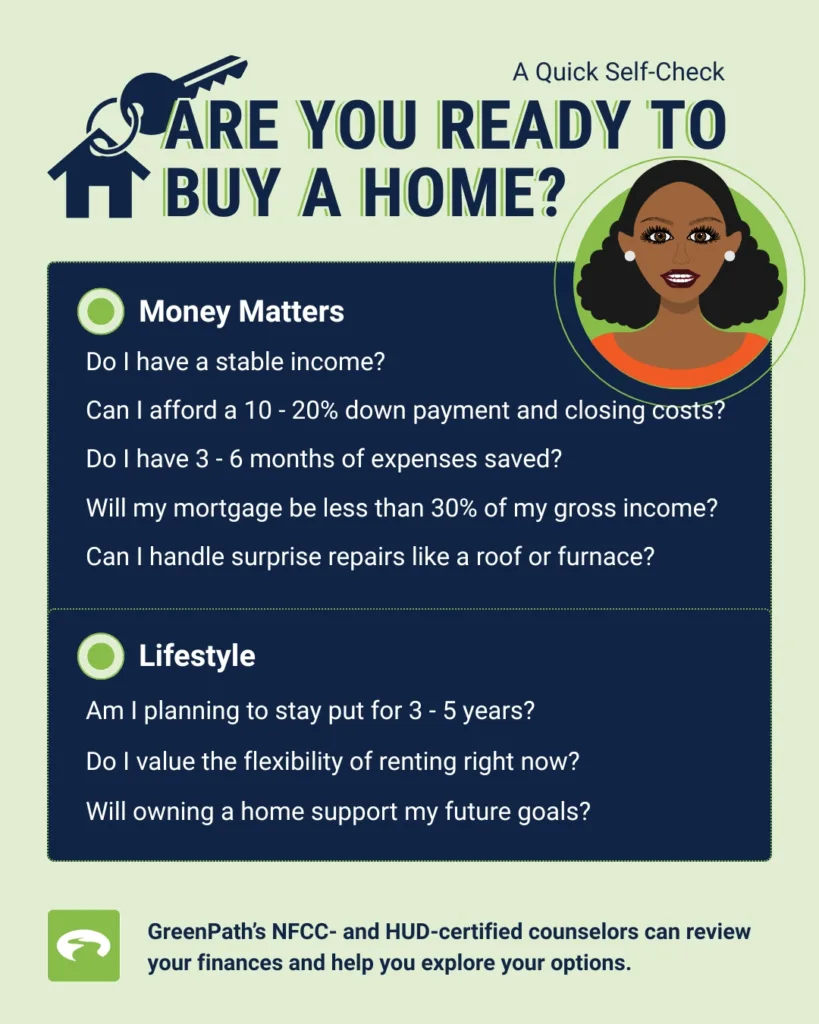Homeownership offers long-term wealth-building opportunities, but current affordability challenges are significant.
Beyond mortgage payments, homeowners face substantial annual costs, averaging over $24,000 in non-mortgage expenses.
If you’re uncertain about homeownership, consider seeking guidance through GreenPath’s free financial counselingGreenPath’s free financial counseling.
June Is National Homeownership Month: Why the Timing Matters
Every June, National Homeownership Month invites Americans to consider the significance of owning a homeowning a home. For some, it’s a symbol of stability and independence. For others, it feels out of reach—or maybe even out of alignment with their financial goals.
Before making a decision, it’s important to understand the home buying process as a series of steps, from assessing your readiness to closing the deal.
In 2025, with nearly 75% of U.S. households unable to afford a median-priced new home (National Association of Home Builders), it’s no surprise that many are asking themselves: “Is now really the right time to buy?” The first step is assessing your financial readiness and goals to determine if homeownership fits your current situation.
Spoiler alert: there’s no one-size-fits-all answer. But understanding the full home-buying journey can help you make a confident decision.
The Real Costs of Owning a Home: Monthly Mortgage Payments and More
Most people know they’ll need to budget for a down payment and monthly mortgage. But that’s just the beginning. It’s important to have enough money set aside for both expected and unexpected costs throughout the home-buying process.
According to Clever Real Estate, the average annual non-mortgage cost of homeownership is $24,529, which includes
- Property taxes
- Homeowners insurance
- Utilities
- Maintenance and repairs
- HOA fees (if applicable)
- Lawn care and snow removal
- Appliance replacement and home upgradeshome upgrades
- Services such as internet, cable, and ongoing home maintenance
- Monthly mortgage payments
Quick Stat
42% of homeowners with regrets cited ongoing maintenance and hidden costs being more expensive than anticipated as their top complaint.
Before you buy, be honest about what you can afford—not just monthly, but seasonally and annually. Home prices and the purchase price of properties can vary widely, directly affecting affordability. The current value of a home, determined by an appraisal, impacts the loan amount you can secure and plays a key role in negotiations.
A home inspection is highly recommended, and an inspection contingency can protect buyers by allowing them to back out or negotiate if significant issues are found. Buyers can sometimes negotiate credits for repairs after the inspection.
Tax returns are often required by lenders and mortgage lenders to verify your income during the loan application process. Understanding your financing options is crucial, as lenders evaluate different properties and offer various loan types to fit your needs. Many states offer assistance programs that can help offset some of these costs.
Why People Still Buy: The Long-Term Upside
Despite the costs, homeownership still offers a clear path to building wealth. Key factors influencing the decision to pursue homeownership include the potential for equity growth and predictable monthly payments, which can provide financial stability for buyers and borrowers. Access to homeownership can help buyers and borrowers build long-term wealth and achieve greater financial security.
Over time, as you pay down your mortgage and your home (ideally) increases in value, you build equity. That equity becomes a financial asset—something renters don’t typically benefit from.
The benefits of homeownership are influenced by the interest rate and interest rates you secure on your loans, as these directly affect your monthly payments and the overall cost of borrowing.
Demand, supply, and location are important factors that affect the appreciation of home values and the potential for building equity. When assessing the value of a property, comparing similar homes in the area can help determine a fair price.
To complete the homebuying process, the buyer negotiates a deal, signs the necessary documents, and finally moves into their new home, achieving the goal of homeownership.
Benefits of Homeownership:
- Equity Growth – As you pay down your mortgage and home values appreciate, you build equity—potentially one of the biggest contributors to long-term wealth.
- Predictable Payments – With a fixed-rate mortgage, your principal and interest payments stay the same—even if rent rises.
- Tax Advantages – Mortgage interest and property tax deductions can reduce your taxable income.
- Personal Freedom – Make changes to your home without needing landlord approval.
Not Sure If You’re Ready for the Homebuying Process? Ask Yourself These Questions
Buying a home is a financial and lifestyle decision. If you’re feeling uncertain, consider the following Financial Readiness Checklist to help guide you through the homebuying process:
Financial Readiness Checklist: Down Payment and Other Essentials
- Do I have a stable source of income?
- Can I afford a down payment (ideally 10–20%) and closing costs?
- Do I have at least 3–6 months of expenses saved in an emergency fund?
- Can I qualify for a mortgage with a manageable monthly payment (ideally less than 30% of gross income)?
- Am I prepared for surprise expenses like a new roof, water heater, or major repair?
Lifestyle Considerations:
- Am I planning to stay in one place for at least 3–5 years?
- Would I prefer the flexibility of renting right now?
- Does owning a home support or limit my long-term goals (career, travel, family plans)?
Still on the Fence? You Don’t Have to Figure it out Alone
Homeownership is one of the biggest financial commitments you can make—and it’s OK to feel overwhelmed.
That’s where we come in. GreenPath’s NFCC- and HUD-certified counselors are here to help you:
- Review your current financial picture
- Explore whether homeownership fits your goals
- Understand your mortgage options and obligations
- Build a plan for debt reductiondebt reduction and long-term savings
Whether you’re actively house hunting or just testing the waters, it helps to talk through your finances with someone who can offer unbiased support.
You Might Also Be Interested In…

GreenPath Financial Service
Housing Counseling
Do you have questions about housing? Should you buy a home? Refinance your house? What if you can’t make your mortgage payments? Or your credit isn’t great? GreenPath can help.










